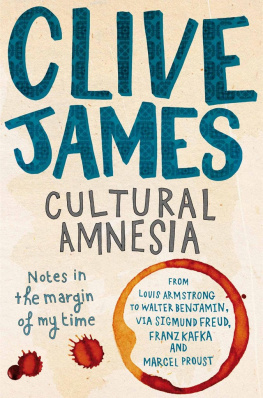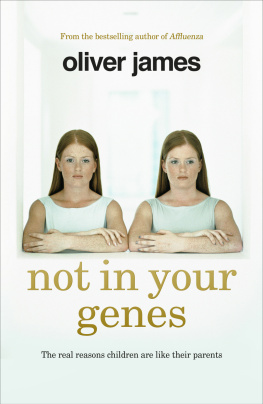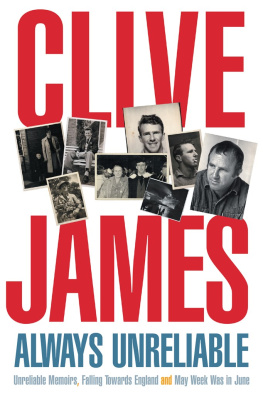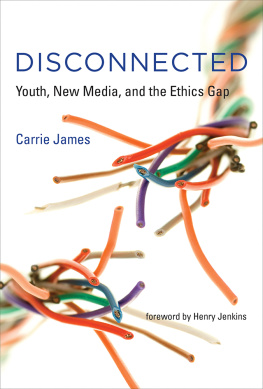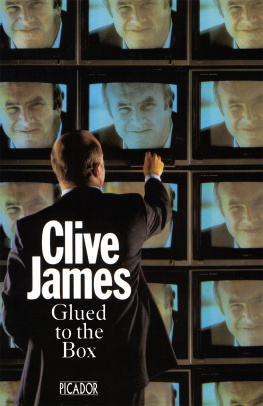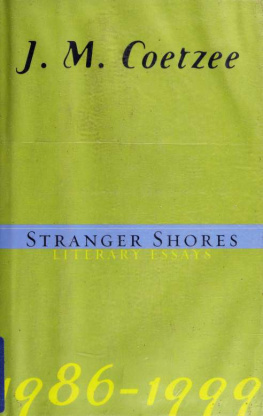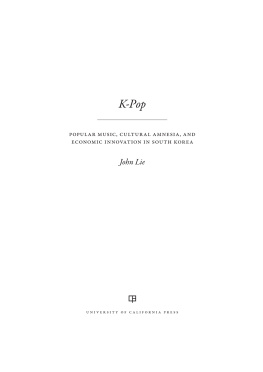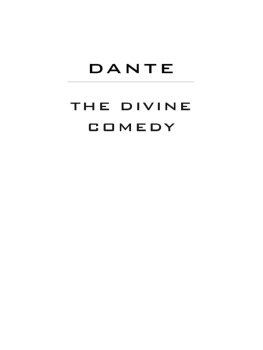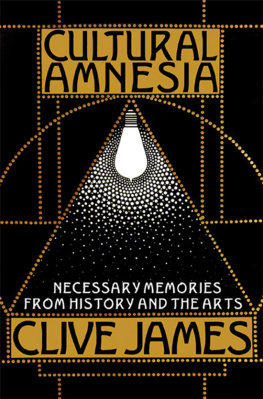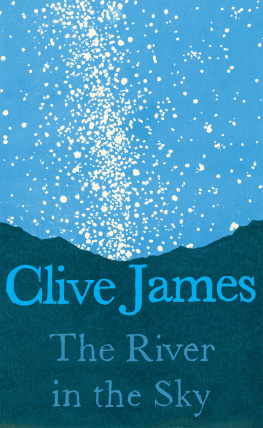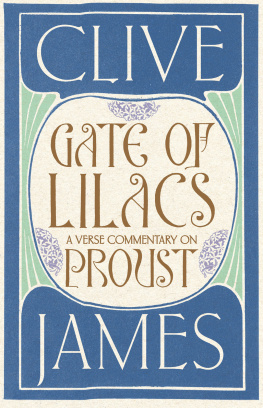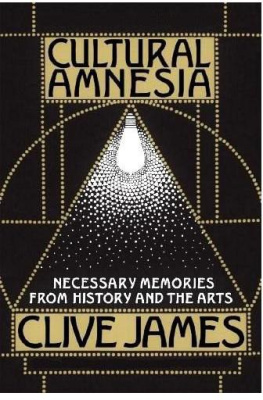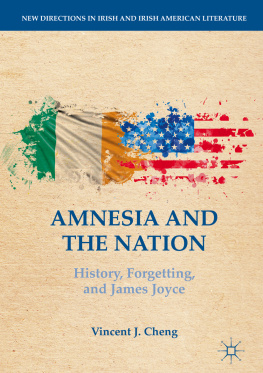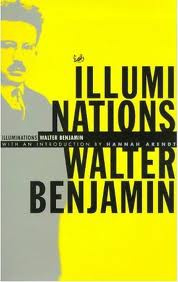CULTURAL AMNESIA
NOTES IN THE MARGIN OF MY TIME
CLIVE JAMES
P I C A D O R
To
Aung San Suu Kyi, Ayaan Hirsi Ali, Ingrid Betancourt
and to the memory of
Sophie Scholl
All history is contemporary history.
BENEDETTO CROCE
At certain times the world is overrun by false scepticism. Of the true kind there can never be enough.
BURCKHARDT, Weltgeshichtliche Betrachtungen
One insults the memory of the victims of Nazism if one uses them to bury the memory of the victims of communism.
JEAN-FRANOIS REVEL, La Grande Parade
In a universe more and more abstract, it is up to us to make sure that the human voice does not cease to be heard.
WITOLD GOMBROWICZ, Journal
We should esteem the man who is liberal, not the man who decides to be so.
MACHIAVELLI
To philosophize means to make vivid.
NOVALIS
Those are nearer to reality who can deal with it light-heartedly, because they know it to be inexhaustible.
GOLO MANN
INTRODUCTION
I N THE FORTY years it took me to write this book, I only gradually realized that the finished work, if it were going to be true to the pattern of my experience, would have no pattern. It would be organized like the top of my desk, from which the last assistant I hired to sort it out has yet to reappear. The book I wanted to write had its origins in the books I was reading. Several times, in my early days, I had to sell my best books to buy food, so I never underlined anything. When conditions improved I became less fastidious. Not long after I began marking passages for future consideration, I also began keeping notes in the margin beside the markings, and then longer notes on the endpapers. Those were the very means by which Montaigne invented the modern essay, and at first I must have had an essay of my own in mind: a long essay, but one with the usual shape, a single line of argument moving through selected perceptions to a neat conclusion.
In the short term, many of my annotations went into book reviews and pieces for periodicals: writings which took an essay form, and which, when I collected them into volumes, I unblushingly dignified with that term. But there were always annotations that struck me as not fitting any scheme except a much larger one, to be attempted far in the future, probably towards the end of my life. By the time that terminus was in clear sight, however, I had begun to live with the possibility that there could be no scheme.
There could only be a linear cluster of nodal points, working the way the mindor at any rate my mind, such as it isworks as it moves through time: a trail of clarities variously illuminating a dark sea of unrelenting turbulence, like the phosphorescent wake of a phantom ship. Far from a single argument, there would be scores of arguments. I wanted to write about philosophy, history, politics and the arts all at once, and about what had happened to those things during the course of the multiple catastrophes into whose second principal outburst (World War I was the first) I had been born in 1939, and which continued to shake the world as I grew to adulthood. Even in an ideal world, none of those subjects would be an easily separable category, and in the far from ideal world we had been given to live in they were inextricably mixed. Each of them, it seemed to me, could have no overt order at the best of times: its order could only be internal, complex, organic. And in the worst of times, which has become our time, any two or more of them taken together must show the same effect dizzily multiplied: the organic complexities intermingled into a texture so intricate that any order extracted from it could be called only provisional.
Well, that would fit. Modern history had given us enough warning against treating simplifications as real. The totalitarian states, the great sponsors of mass atrocity against innocent human beings, had been propelled by ideologies, and what else was an ideology except a premature synthesis? As the time for assembling my reflections approached, I resolved that a premature synthesis was the thing to be avoided.
SO THIS IS a book about how not to reach one. If I have done my job properly, themes will emerge from the apparent randomness and make this work intelligible. But it will undoubtedly be a turbulent read. The times from which it emerged were hard on the nerves, even for those of us who were lucky enough to lead charmed lives. I hope that the episodically intermixed account of direct experience from my own charmed life will alleviate the difficulties of a densely woven text, but I make no excuse for them. If this book were not difficult, it would not be true.
To younger readers who might find themselves wondering why it is so full of forgotten names, and takes such a violently unpredictable course, the first thing to say is: welcome to the twentieth century, out of which your century grew as surely as a column of black smoke grows from an oil fire. The second thing, though an adjunct of the first, is even more important: there is a lot at stake here. In the nineteenth century, in the time of the great philologist Ernest Renan, and despite the contrary evidence already provided by the French Revolution, Studia humanitatis was still thought of as an unmixed blessing. If the eighteenth century had meant to usher in the age of reason, the nineteenth century, with the cold snick of the guillotine ringing in its ears, meant to supply some of the regrettable deficiencies of reason by the addition of science. Apart from the prophetsDickens, despite his inborn optimism, was one of themfew people with any aspirations to a philosophical view doubted that the extension of human knowledge would, in Renans typically generous phrase, largir la grande famille : produce a race of the enlightened to lead a life of mathematically calculable justice. By now, after the twentieth century has done its cruel work, that is exactly what we doubt. The future of science, Renans cherished avenir de la science , can be assessed from our past, in which it flattened cities and gassed innocent children: whatever we dont yet know about it, one thing we already know is that it is not necessarily benevolent. But somewhere within the total field of human knowledge, humanism still beckons to us as our best reason for having minds at all.
That beckoning, however, grows increasingly feeble. The arts and their attendant scholarship are everywhereimperishable consumer goods which a self-selecting elite can possess while priding itself as being beyond materialism; they have a glamour unprecedented in historybut humanism is hard to find. For that, science is one of the culprits: not the actual achievement of science, but the language of science, which, clumsily imitated by the proponents of Cultural Studies, has helped to make real culture unapproachable for exactly those students who might otherwise have been most attracted to it, and has simultaneously furthered the emergence and consolidation of an international cargo cult whose witch doctors have nothing in mind beyond their own advancement. By putting the humanities to careerist use, they set a bad example even to those who still love what they study. Learned books are published by the thousand, yet learning was never less trusted as something to be pursued for its own sake. Too often used for ill, it is now asked about its use for good, and usually on the assumption that any goodwill be measurable on a market, like a commodity. The idea that humanism has no immediately ascertainable use at all, and is invaluable for precisely that reason, is a hard sell in an age when the word invaluable, simply by the way it looks, is begging to be construed as valueless even by the sophisticated. In fact, especially by them. If the humanism that makes civilization civilized is to be preserved into this new century, it will need advocates. Those advocates will need a memory, and part of that memory will need to be of an age in which they were not yet alive.
Next page
